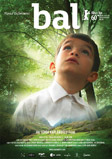14.01.2011
Turkish Director Semih Kaplanoglu's "Bal" (Honey) (2010): Joseph and Jacob relationship revisited in a contemporary scenario
JUGU ABRAHAM / MOVIES THAT MAKE YOU THINK
Turkish cinema is on the march. Semih Kaplanoglu's Bal (Honey) is an unusual film in many ways—it has no music at all, it grabs your senses by focusing on natural sounds and sights, indoors and outdoors. It is different.
To appreciate Bal beyond the obvious sights and sounds, one has to be well read on the theological tale of Joseph and Jacob (or Yusuf and Yakub) common to three great religions of the world—Christianity, Islam and Judaism. The intricate relationship of father, son and God/Allah, paves the way for the "spiritual realism" of Semih Kaplanoglu's cinema.
The story of Bal appears to be simple, but it is not so simple. It is a tale of Yusuf (read Joseph), a young boy, with a narrative structure that uses an Islamic perspective. Like the Joseph of the Bible, Yusuf dreams, and shares them with his father Yakup/Yakub (read Jacob). Yusuf/Joseph is an interpreter of dreams. Yakub/Jacob advises his son in the film Bal/Honey never to share his dreams with others. To understand the importance of this seemingly innocuous statement the viewer has to be familiar with the religious books of any of the three religions. When Yakub dies (the death of Yakub is captured cinematically in way that is reminiscent of death captured in Iñárritu's Biutiful, both films made in 2010, amidst visual references to tall trees and metaphors of unusual birds, owls in one, hawks in the other), his son Yusuf stops speaking and searches for his father on his own using his dreams as clues. The intense but silent bonding between father and son (a superb performance by child actor Bora Atlas) is amazingly and sensitively captured in Bal, again recalling a similar bonding of a father and his children in Iñárritu's Biutiful. All elements of the film comes together seamlessly because Kaplanoglu is the co-screeplaywriter and co-editor as well.
This notable and uplifting Turkish film, set in the Black Sea region of the country, is an odd film if seen from a conventional movie viewer's perspective. It is the third and final film of director Semih Kaplanoglu's Yusuf trilogy—three films named after Yusuf the lead and part-autobiographical character in all the three films somewhat like the Apu trilogy of Satyajit Ray. The three films are called Süt (Milk), Yumurta (Egg), and Bal (Honey). Odd names indeed to describe the life stages of a human being! But wait the oddest bit is that one would expect the three films to be chronological segments: first of the child (and the death of his father), the second of the coming of age of young man struggling to be a poet, and the third segment on the established adult poet (and the death of his mother). But for director Kaplanoglu that does not work: his three films are not presented in chronological order.
To revert to the awesome movie itself, the fine narrative is punctuated by the visit of young Yusuf to his grandmother's house during which on a magical night he learns of the story of the Prophet Mohammad's arrival in Mecca after climbing the Miraj (ladder) and conversing with Abraham, Moses and Jesus, after meeting Allah (God) to retell his experiences in heaven. For young Yusuf he uses clues from his dreams and the tale of Prophet Mohammad to unite with his dead father Yakup in spirit at the place he died.
Beyond the magical/spiritual realism the film Bal provides a great essay on the classical father-son relationship. In the classroom (an interesting inversion of the dense forest), young Yusuf struggles for social acceptance, sometimes with perseverance, sometimes with guile, passing off his bench mate's homework as his own. The film is able to capture Yusuf alone in his classroom (even when the class is full of students, Yusuf is strangely alone) just as it captures Yusuf alone in the forest. Interestingly, the film underscores a factor often missing in today’s society: a child with a speaking disability gets total undiluted support from his father, building a bond that matters in life, even after the father's death. Again to truly appreciate the father-son spiritual bonding one has to study the Joseph/Jacob dyad from the religious texts that goes beyond a mere social relationship. The last shot of the film may be silent but it is one of the finest sophisticated and subtle endings in cinema's history.
|
|
|




